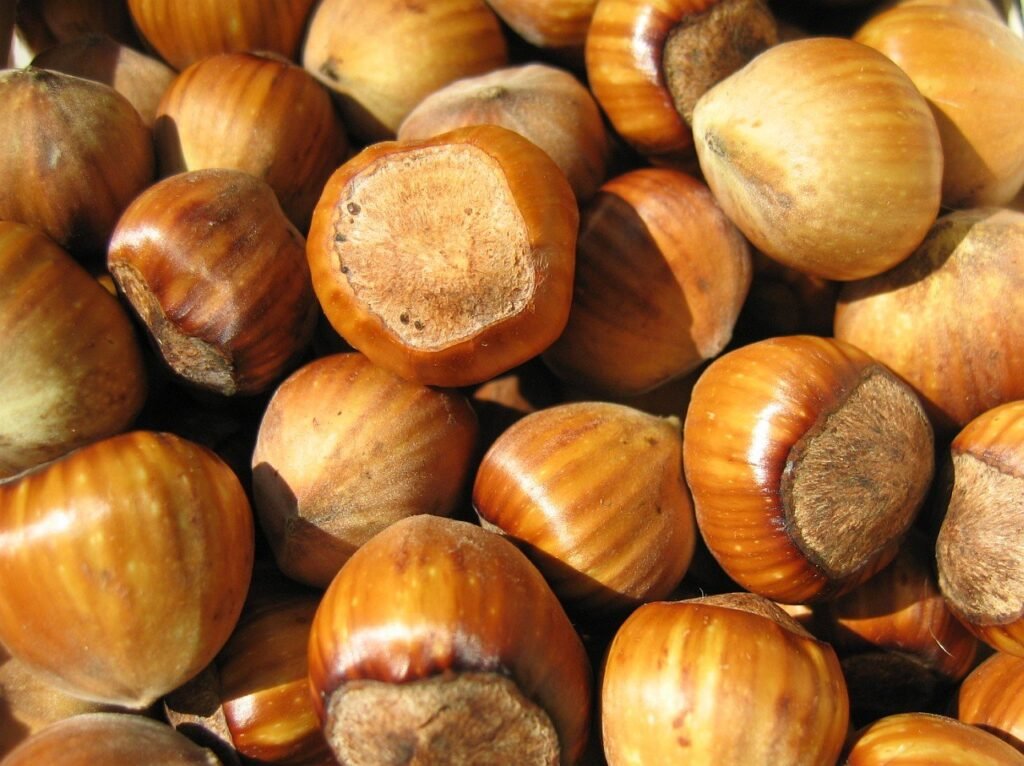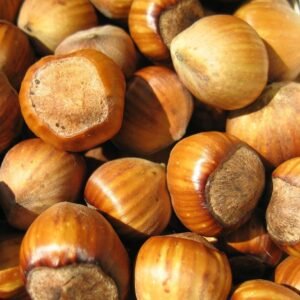Hazelnuts
Hazelnuts are one of the most delicious and nutritious nuts that are enjoyed all around the world. They have a unique flavor and texture, making them a favorite ingredient in many recipes, including desserts, pastries, and salads. But did you know that not all hazelnuts are created equal? Organic hazelnuts are the healthier, more sustainable, and more flavorful option. In this article, we’ll take a closer look at what organic hazelnuts are, how they are grown, their health benefits, and why you should consider switching to organic hazelnuts
1. What are Organic Hazelnuts?
Organic hazelnuts are grown without the use of synthetic fertilizers, pesticides, herbicides, or genetically modified organisms (GMOs). Instead, organic farmers rely on natural and sustainable farming practices that enhance soil health, promote biodiversity, and reduce environmental pollution. Organic hazelnuts are certified by independent third-party organizations, such as the USDA or the European Union, to ensure that they meet strict organic standards.
2. The Benefits of Organic Hazelnuts
2.1 Nutritional Benefits
Organic hazelnuts are not only delicious but also packed with nutrients that can benefit your health in many ways. They are an excellent source of protein, fiber, healthy fats, vitamins, and minerals, such as vitamin E, magnesium, potassium, and calcium. Hazelnuts also contain antioxidants, such as flavonoids and phenolic compounds, that can protect your cells from oxidative stress and inflammation. Eating organic hazelnuts may help you:
- Lower your risk of heart disease and stroke
- Improve your cholesterol levels
- Manage your blood sugar levels
- Enhance your brain function and memory
- Boost your immune system
- Reduce your risk of cancer
2.2 Environmental Benefits
Organic hazelnuts are grown using sustainable farming practices that preserve the natural resources and ecosystems. Organic farmers avoid using synthetic fertilizers, pesticides, and herbicides that can pollute the soil, water, and air. They also promote biodiversity by planting cover crops, rotating crops, and preserving the natural habitats of wildlife. By choosing organic hazelnuts, you can support farmers who are committed to protecting the environment and conserving the natural resources for future generations.
2.3 Social Benefits
Organic hazelnuts are often grown by small-scale and family-owned farms that rely on fair labor practices and promote social justice. Organic certification programs require that farmers provide safe and healthy working conditions, fair wages, and respect the human rights of their workers.
3. How are Organic Hazelnuts Grown?
Organic hazelnuts are grown using sustainable and natural farming methods that are beneficial to the environment and human health. Here’s a step-by-step guide on how organic hazelnuts are grown:
3.1 Soil Preparation
The first step in growing organic hazelnuts is to prepare the soil. Organic farmers use natural methods to enrich the soil with nutrients, such as compost, manure, and cover crops. They also avoid using synthetic fertilizers that can harm the soil microbiome and reduce the soil’s fertility over time.
3.2 Planting
Once the soil is prepared, organic farmers plant the hazelnut trees. They choose disease-resistant varieties that can thrive in the local climate and soil conditions. Hazelnut trees are usually planted in rows with a spacing of about 15 feet between trees. To encourage pollination, farmers plant different hazelnut varieties that bloom at different times.
3.3 Harvesting
Hazelnut trees typically begin to bear fruit after 3-4 years of planting. The nuts mature in the late summer or early fall and are ready for harvesting. Organic farmers usually harvest the nuts by hand to avoid damaging the trees and to ensure that only mature nuts are picked. Once harvested, the nuts are dried and stored in a cool and dry place to preserve their freshness and flavor.
4. How to Incorporate Organic Hazelnuts into Your Diet
Organic hazelnuts are a versatile and delicious ingredient that can be used in many recipes. Here are some ways to incorporate organic hazelnuts into your diet:
4.1 Hazelnut Butter
Hazelnut butter is a healthy and delicious alternative to peanut butter. Simply blend roasted organic hazelnuts in a food processor until smooth and creamy, and add a pinch of salt and sweetener if desired. Hazelnut butter can be used as a spread on toast, in smoothies, or as a dip for fruits and vegetables.
4.2 Roasted Hazelnuts
Roasted organic hazelnuts make a tasty and nutritious snack that can be enjoyed anytime. Simply roast the nuts in the oven for 10-15 minutes at 350°F until golden brown and fragrant. You can also add some spices, such as cinnamon or paprika, to give the nuts some extra flavor.
4.3 Hazelnut Milk
Hazelnut milk is a dairy-free and nutritious alternative to cow’s milk. Simply blend roasted organic hazelnuts with water, and strain the mixture through a cheesecloth or nut milk bag to remove the solids. Hazelnut milk can be used in coffee, tea, smoothies, or as a dairy-free milk substitute in recipes.
4.4 Hazelnut Flour
Hazelnut flour is a gluten-free and nutritious alternative to wheat flour. Simply blend roasted organic hazelnuts in a food processor until finely ground, and use it in recipes that call for flour, such as cakes, cookies, and bread.
5. Frequently Asked Questions
5.1 What is the difference between organic and conventional hazelnuts?
Organic hazelnuts are grown without the use of synthetic fertilizers, pesticides, herbicides, or GMOs, while conventional hazelnuts may contain these chemicals. Organic hazelnuts are also certified by independent third-party organizations to ensure that they meet strict organic standards.
5.2 Are organic hazelnuts more expensive?
Organic hazelnuts may be slightly more expensive than conventional hazelnuts due to the higher cost of organic farming practices and certification.
5.3 Are organic hazelnuts more nutritious?
Organic hazelnuts
do not necessarily have higher nutrient content than conventional hazelnuts, but they are free from synthetic chemicals that may have harmful effects on human health and the environment.
5.4 How should I store organic hazelnuts?
Organic hazelnuts should be stored in a cool and dry place, such as a pantry or refrigerator, to preserve their freshness and flavor. They can also be stored in an airtight container or freezer bag in the freezer for up to 6 months.
5.5 Can I eat hazelnuts if I have a nut allergy?
Hazelnuts are a tree nut and may cause allergic reactions in people with nut allergies. If you have a nut allergy, it’s best to avoid hazelnuts and other tree nuts altogether.
Conclusion
Organic hazelnuts are a nutritious and delicious ingredient that can be enjoyed in many recipes. They are grown using sustainable and natural farming methods that are beneficial to the environment and human health. By incorporating organic hazelnuts into your diet, you can reap the health benefits of this nutrient-dense food while supporting organic agriculture and the local economy.
7.1 Are organic hazelnuts more expensive than conventional hazelnuts?
Yes, organic hazelnuts tend to be more expensive than conventional hazelnuts due to the higher cost of organic farming practices and certification.
7.2 Can I use organic hazelnuts in baking?
Yes, organic hazelnuts are a great ingredient for baking. They can be chopped and added to cookies, cakes, and bread or used to make hazelnut butter or flour.
7.3 Are organic hazelnuts sustainable?
Yes, organic hazelnuts are sustainable because they are grown using natural farming practices that promote soil health, biodiversity, and water conservation. Organic farming also avoids the use of synthetic chemicals that can harm the environment and human health.
7.4 Are organic hazelnuts healthier than conventional hazelnuts?
There is no significant difference in the nutrient content of organic and conventional hazelnuts. However, organic hazelnuts are free from synthetic chemicals that may have harmful effects on human health and the environment.
7.5 Can I eat hazelnuts if I have diabetes?
Hazelnuts can be a healthy snack option for people with diabetes because they are low in carbohydrates and high in healthy fats and fiber. However, it’s important to monitor your portion size and overall carbohydrate intake to maintain blood sugar control.
Lorem ipsum dolor sit amet, consectetur adipiscing elit. Ut elit tellus, luctus nec ullamcorper mattis, pulvinar dapibus leo.
Lorem ipsum dolor sit amet, consectetur adipiscing elit. Ut elit tellus, luctus nec ullamcorper mattis, pulvinar dapibus leo.





